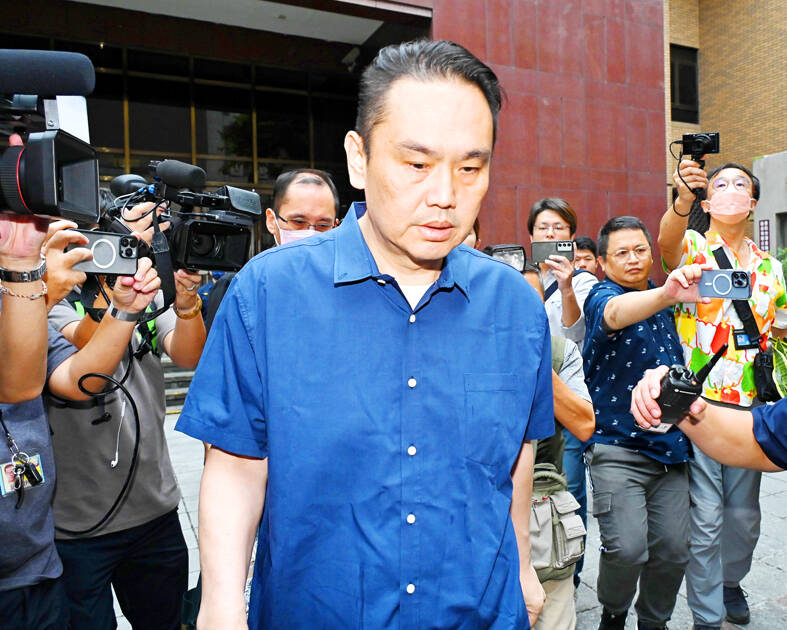Taipei City Councilor Chen Chung-wen (陳重文) was yesterday sentenced to nine years in prison after being found guilty of illegally obtaining more than NT$3.7 million (US$113,081) for himself and a business partner through a public project.
According to the Taipei District Court ruling, Chen was found guilty of corruption and a range of other offenses related to his involvement in a city government procurement project.
Six months of the sentence could be commuted to a fine of approximately NT$180,000, the ruling said.

Photo: Tu Chien-jung, Taipei Times
Chen, a member of the Chinese Nationalist Party (KMT) who has served as a city councilor since December 2014, said he would discuss the ruling with his attorney before deciding whether to appeal the court’s decision.
The court found that Chen had used his position to pressure the Taipei Department of Social Welfare and the Taiwan Intelligent Fiber Optic Network Consortium on multiple occasions last year.
Because of that pressure, the social welfare department awarded a contract for the installation of cloud-based CCTV systems across the city’s public nursing care centers to the consortium, the court said.
It subcontracted the project to a company Chen set up with his business partner Kang Li-chi (康立錡) in July last year, the ruling said, before passing the project to Kang’s own company, Vqorder Co.
Through these dealings, Chen made nearly NT$3.09 million in illegal gains, and Kang made NT$610,845, the ruling said.
In pressuring the social welfare department for his own benefit, Chen violated a provision in Article 6 of the Anti-Corruption Act (貪污治罪條例), according to the court.
The provision mandates a sentence of at least five years for “using the opportunity provided by one’s position or status for unlawful gains for oneself or for others in matters under his or her charge or supervision while clearly knowing the act violates the law.”
Chen was also convicted of falsely inflating the capital of the company he cofounded with Kang as well as his other company.
Chen’s wife, Pai Hui-ping (白惠萍), who had managed his finances, was given a one-year sentence, suspended for two years, for her involvement in the case.
Her sentence could be commuted to a fine, but she was ordered to pay an additional NT$200,000 to the public treasury.
Kang received a three-year suspended sentence and was ordered to pay NT$300,000 to the public treasury and complete 100 hours of community service.
Chen and the others were indicted by the Taipei District Prosecutors’ Office on July 19, with the 47-year-old city councilor charged with seeking illegal gains, forging documents and embezzlement, among other offenses.
Prosecutors had called for heavy punishment for Chen, citing in particular his repeated requests for documents from the social welfare department and questioning of the department’s officials during city council meetings, among other means of exerting pressure.

Beijing could eventually see a full amphibious invasion of Taiwan as the only "prudent" way to bring about unification, the US Department of Defense said in a newly released annual report to Congress. The Pentagon's "Annual Report to Congress: Military and Security Developments Involving the People's Republic of China 2025," was in many ways similar to last year’s report but reorganized the analysis of the options China has to take over Taiwan. Generally, according to the report, Chinese leaders view the People's Liberation Army's (PLA) capabilities for a Taiwan campaign as improving, but they remain uncertain about its readiness to successfully seize

HORROR STORIES: One victim recounted not realizing they had been stabbed and seeing people bleeding, while another recalled breaking down in tears after fleeing A man on Friday died after he tried to fight the knife-wielding suspect who went on a stabbing spree near two of Taipei’s busiest metro stations, Taipei Mayor Chiang Wan-an (蔣萬安) said. The 57-year-old man, identified by his family name, Yu (余), encountered the suspect at Exit M7 of Taipei Main Station and immediately tried to stop him, but was fatally wounded and later died, Chiang said, calling the incident “heartbreaking.” Yu’s family would receive at least NT$5 million (US$158,584) in compensation through the Taipei Rapid Transit Corp’s (TRTC) insurance coverage, he said after convening an emergency security response meeting yesterday morning. National

Taiwan has overtaken South Korea this year in per capita income for the first time in 23 years, IMF data showed. Per capita income is a nation’s GDP divided by the total population, used to compare average wealth levels across countries. Taiwan also beat Japan this year on per capita income, after surpassing it for the first time last year, US magazine Newsweek reported yesterday. Across Asia, Taiwan ranked fourth for per capita income at US$37,827 this year due to sustained economic growth, the report said. In the top three spots were Singapore, Macau and Hong Kong, it said. South

PLANNED: The suspect visited the crime scene before the killings, seeking information on how to access the roof, and had extensively researched a 2014 stabbing incident The suspect in a stabbing attack that killed three people and injured 11 in Taipei on Friday had planned the assault and set fires at other locations earlier in the day, law enforcement officials said yesterday. National Police Agency (NPA) Director-General Chang Jung-hsin (張榮興) said the suspect, a 27-year-old man named Chang Wen (張文), began the attacks at 3:40pm, first setting off smoke bombs on a road, damaging cars and motorbikes. Earlier, Chang Wen set fire to a rental room where he was staying on Gongyuan Road in Zhongzheng District (中正), Chang Jung-hsin said. The suspect later threw smoke grenades near two exits